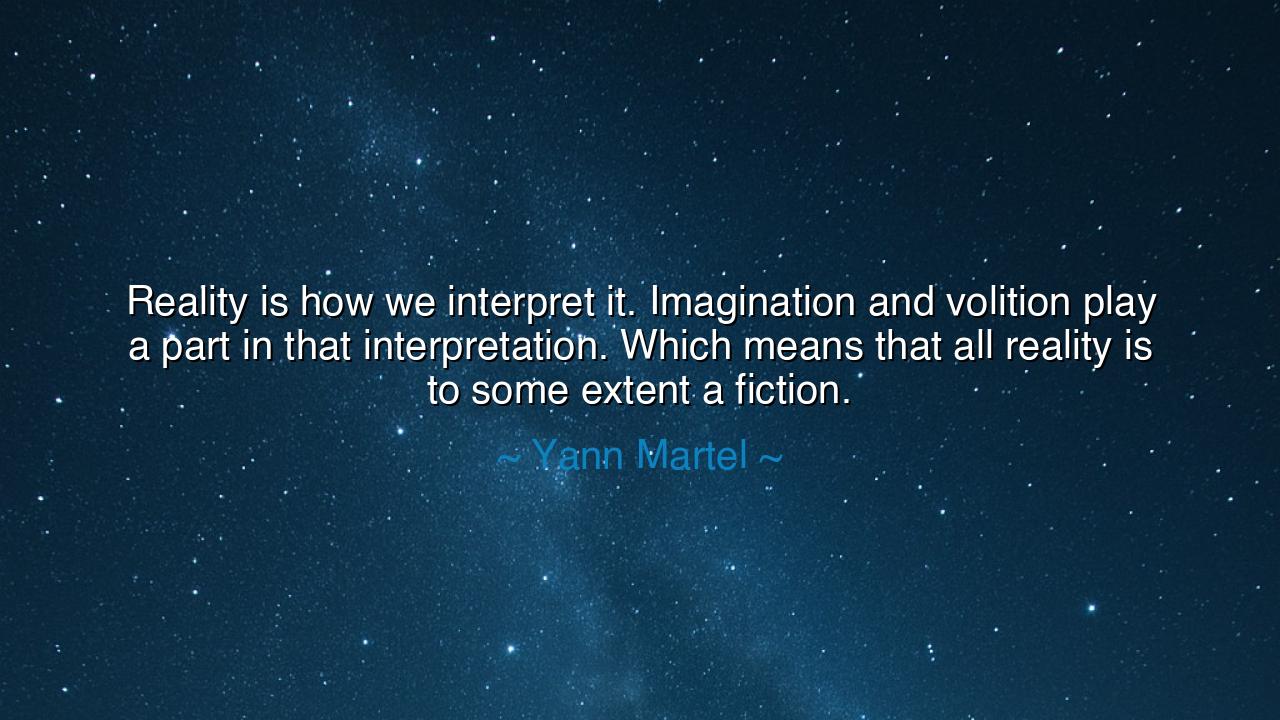
Reality is how we interpret it. Imagination and volition play a
Reality is how we interpret it. Imagination and volition play a part in that interpretation. Which means that all reality is to some extent a fiction.






“Reality is how we interpret it. Imagination and volition play a part in that interpretation. Which means that all reality is to some extent a fiction.” Thus spoke Yann Martel, the author of Life of Pi, a weaver of tales where faith and perception intertwine. In this saying, Martel unveils one of the oldest truths of the human spirit: that reality, far from being a fixed and solid thing, is shaped by the mind that beholds it. The world we see is not merely what is, but what we believe it to be. Through imagination and will, we give meaning to chaos; we write stories upon the silence of existence.
Martel, in his wisdom, does not deny the physical world — the earth beneath our feet, the sea that roars, the sun that burns. Rather, he reminds us that what we call reality is filtered through our perception. Two men may look upon the same storm: one sees divine wrath, the other the poetry of nature. The storm is the same, but the story is different. It is in that act of storytelling — conscious or unconscious — that fiction is born. Thus, all human experience is interpretation, and every truth we hold is woven from threads of both fact and imagination.
This insight lies at the heart of Martel’s own work. In Life of Pi, the boy Pi survives a shipwreck by living through two tales — one of brutal reality, and one of miraculous wonder. In the end, he asks: “Which story do you prefer?” The question reveals the essence of this quote. For reality is not always about what literally happened, but what we choose to see and believe. The imagination becomes not an escape from truth, but its companion — a sacred tool that allows us to bear the unbearable, to make meaning of suffering, and to turn despair into faith.
This philosophy is not new, but ancient. The Greek philosophers spoke of perception as a mirror that reflects not the thing itself, but our mind’s image of it. The Buddha taught that the world is shaped by thought: “With our thoughts, we make the world.” Even the mystics of the West — Augustine, Blake, Rumi — knew that imagination is not fantasy, but the inner eye through which we see reality’s deeper face. Martel’s words continue this lineage, teaching that truth itself is not destroyed by imagination, but revealed through it.
Consider the story of Helen Keller, born without sight or hearing. To most, her world would seem devoid of color, sound, and form — a void of perception. Yet through imagination and the will of her teacher Anne Sullivan, Keller learned to feel meaning in touch and movement. The world she experienced was unlike that of anyone else, but it was no less real. Indeed, through her, we learn that reality depends not on what is visible, but on how it is interpreted. Her life was proof that the human spirit can create a full universe from what others would call darkness.
In this, Martel teaches us something heroic: that to live is to interpret, and to interpret is to create. Every person, knowingly or not, is an author of reality. Our fears write one kind of world; our hopes, another. Our volition, our choice of how to see, gives shape to our days. A pessimist and a poet may walk the same road — one sees dust and decay, the other light and possibility. Both are true, but only one brings life. Thus, the art of living lies in choosing the story that nourishes the soul rather than poisons it.
So let this be the lesson, O listener: you are not a prisoner of what is. You are a creator of what can be. Guard your imagination, for it is the lens through which you build your world. Fill it not with despair, but with courage; not with doubt, but with meaning. Let your volition — your conscious will — guide your mind toward beauty, compassion, and purpose. For though the world may not change, the way you see it can change everything.
Thus, remember the wisdom of Yann Martel: reality is a story we tell ourselves. And if that is so, then let your story be worthy of the light. Dream it bravely, live it honestly, and shape it with love — for in doing so, you become both the witness and the author of a life that is more than real. You become the maker of your own myth, and through your imagination, you transform existence itself into art.






AAdministratorAdministrator
Welcome, honored guests. Please leave a comment, we will respond soon